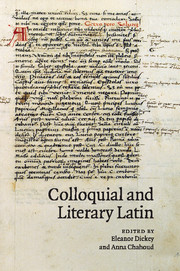Book contents
- Frontmatter
- Contents
- List of contributors
- Acknowledgements
- Foreword (David Langslow)
- PART I THEORETICAL FRAMEWORK
- PART II EARLY LATIN
- 6 Possessive pronouns in Plautus
- 7 Greeting and farewell expressions as evidence for colloquial language: between literary and epigraphical texts
- 8 Colloquial and literary language in early Roman tragedy
- 9 The fragments of Cato's Origines
- PART III CLASSICAL LATIN
- PART IV EARLY PRINCIPATE
- PART V LATE LATIN
- Abbreviations
- References
- Subject index
- Index verborum
- Index locorum
8 - Colloquial and literary language in early Roman tragedy
Published online by Cambridge University Press: 04 April 2011
- Frontmatter
- Contents
- List of contributors
- Acknowledgements
- Foreword (David Langslow)
- PART I THEORETICAL FRAMEWORK
- PART II EARLY LATIN
- 6 Possessive pronouns in Plautus
- 7 Greeting and farewell expressions as evidence for colloquial language: between literary and epigraphical texts
- 8 Colloquial and literary language in early Roman tragedy
- 9 The fragments of Cato's Origines
- PART III CLASSICAL LATIN
- PART IV EARLY PRINCIPATE
- PART V LATE LATIN
- Abbreviations
- References
- Subject index
- Index verborum
- Index locorum
Summary
INTRODUCTION
Roman tragedy has not received the same amount of careful examination as Greek tragedy – not even the tragic œuvre of Seneca and those few other tragedies that happened to survive in full. Partly the fragmentary nature of the textual corpus is to blame, but also, and this is perhaps even more important, the fact that Roman tragedy never managed to leave behind its smell of being secondary, of being derivative, and of being inferior to the Greek models. Nevertheless, some aspects of Roman tragedy, even early Roman tragedy, are reasonably well understood.
Performances of literary and subliterary tragic plays were an integral part of Roman dramatic festivals and were very much appreciated by all strata of Roman society. Leading Roman intellectuals felt that Roman tragedians and tragedies were roughly equal to their Greek counterparts (or even better still). And, in fact, one of the most important reasons why Romans felt so strongly about their tragedies and tragedians was the art and nature of the tragic language.
From a linguist's point of view, the language of Roman tragedy (and, in more general terms, of Roman drama) is a fascinating, artistic and artificial construction – but it could nevertheless have included colloquial features; the principal aim of this paper is to determine whether it did, but we shall also examine the nature of tragic language in a broader sense.
- Type
- Chapter
- Information
- Colloquial and Literary Latin , pp. 127 - 153Publisher: Cambridge University PressPrint publication year: 2010
- 1
- Cited by



